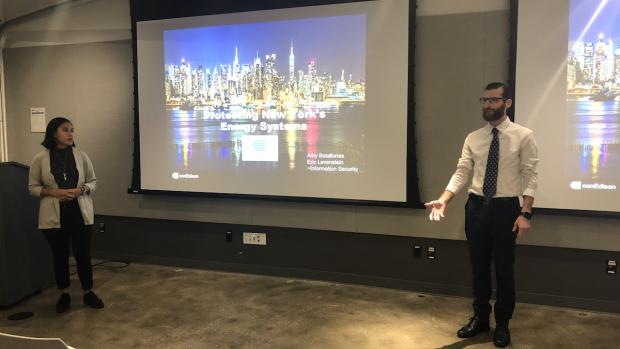Protecting New York’s utilities means protecting New York’s people
ConEd's Cybersecurity Team Speaks to Students about Career Opportunities

Representatives from ConEd's cybersecurity team speak at a career development event for Tandon students
“If you wanna cause chaos is New York, one of the busiest cities in the world, you go for the electricity,” Eric Levenstein, ConEdison cybersecurity specialist told a crowd of NYU Tandon School of Engineering students recently. He and Amy Batallones, Team Lead of the Cybersecurity Operations Center at the utility giant, are both NYU Tandon alumni. As ConEd employees, they stressed the need for strategic cyber defense to the gathered students. Utility companies like ConEd have hard evidence of what a cyber attack could mean for them: in 2015 and 2016, hackers used malware to shut down power grids belonging to energy distribution companies in the Ukraine, cutting off power to hundreds of thousands of people.
“The hackers flooded the help desk line, so if customers wanted help, they couldn’t figure out who had power and who didn’t have power,” Levenstein pointed out. “They also drained the backup power, so that wasn’t accessible either.” A sophisticated hacking strategy like the one in Ukraine has the potential to impact millions of people and vital infrastructure, including schools, transportation systems, and hospitals. Given the potentially tragic implications of those locations losing power, the ConEd team pointed out that their company’s push for sophisticated cyber defense systems and strategies is absolutely essential.“Hacking is much more prevalent in the news these day,” said Batallones. “We care a lot about the safety and security of New York City. If our protections are not in place, then there’s not only potential for power to go down; there’s the potential for loss of life.”
Batallones and Levenstein explained that hackers can target customer and employee data as well as critical infrastructure, and can slip tools to make hacking easier at any point into the supply chain, as demonstrated by the microchips slipped into Apple hardware several years ago.
For students wondering how they can contribute, Batallones was happy to point out that ConEd offers internships that can lead to promising careers for students studying not only cybersecurity but all facets of computer science. The company offers internship programs in risk management, threat management, quality assurance and compliance, and appliance operations. ConEd also offers something called the GOLD Program, an 18-month initiative that serves as a starting point for potential employees. The GOLD Program accepts 40 engineering and business students and places them in different job assignments every 6 months (for 3 job assignments total), with the aim of creating well-rounded individuals who understand the many facets of the company and of encouraging personal relationship building.
The projects assigned to interns aren’t menial tasks, they cautioned, given the importance of protecting New York’s utilities. “We need our interns to do stuff,” Levenstein explained. “Critical thinking skills and initiative are required.”




